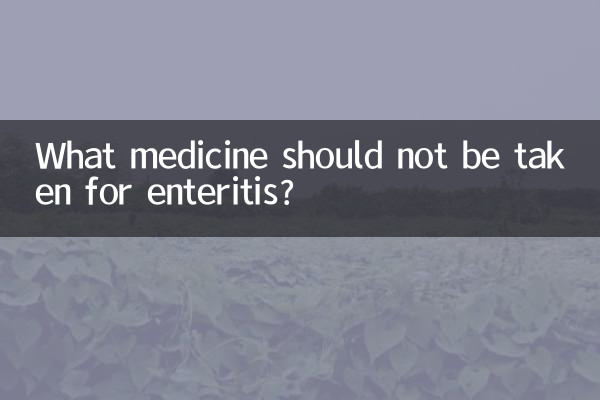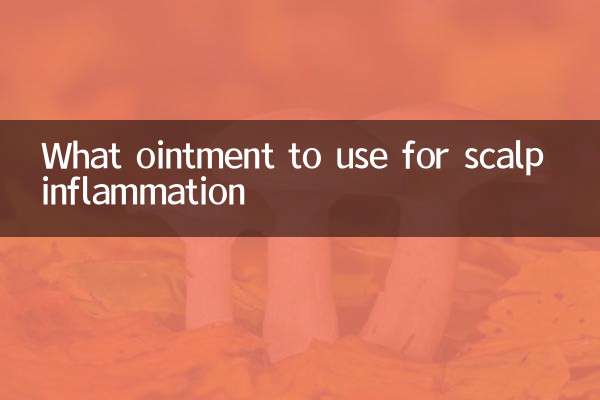Title: What medicine should not be taken for enteritis?
introduction:
Enteritis is a common digestive tract disease, which mainly manifests as abdominal pain, diarrhea, nausea and other symptoms. During the treatment process, rational use of medications is crucial, but not all medications are suitable for patients with enteritis. This article will combine the hot topics and hot content on the Internet in the past 10 days to sort out the drugs that patients with enteritis need to avoid and provide structured data reference.

1. Drugs that patients with enteritis should use with caution
The causes of enteritis are diverse, including viral, bacterial or parasitic infections. The following drugs may aggravate symptoms or cause adverse reactions, and patients should avoid or use them with caution:
| drug type | Common medicines | Potential risks |
|---|---|---|
| Nonsteroidal anti-inflammatory drugs (NSAIDs) | ibuprofen, aspirin | May irritate intestinal mucosa and aggravate inflammation |
| Antibiotics (unnecessary) | Levofloxacin, cephalosporins | May disrupt intestinal flora balance and prolong recovery time |
| Antidiarrheal drugs (acute phase) | Loperamide | May hinder the excretion of pathogens and aggravate infection |
| Alcohol-containing drugs | Some Chinese patent medicine tinctures | Irritate the intestines and aggravate diarrhea |
2. Alternative treatment options for patients with enteritis
For the symptoms of enteritis, it is recommended to give priority to the following safe and effective treatments:
| symptom | Recommended actions |
|---|---|
| diarrhea | Oral rehydration solution (ORS), probiotics |
| stomach ache | Hot compress and antispasmodic drugs (doctor’s guidance required) |
| Vomit | Supplement water and vitamin B6 in small amounts and multiple times |
3. Hot topics related to enteritis in the past 10 days across the Internet
According to the recent popularity of online discussions, the following topics are closely related to enteritis medication:
| topic | heat index | core concerns |
|---|---|---|
| Antibiotic abuse and enteritis | 85% | How to avoid antibiotic-induced intestinal flora imbalance |
| Medication safety for children with enteritis | 78% | Parents’ misunderstandings about the use of antidiarrheal drugs in children |
| Controversy over the treatment of enteritis with traditional Chinese medicine | 65% | Risks of some proprietary Chinese medicines containing laxative ingredients |
4. Expert advice and precautions
1.Identify the cause:Viral enteritis usually does not require antibiotics, but bacterial enteritis requires targeted medication.
2.Hydration first:Especially for children and the elderly, preventing dehydration is more important than stopping diarrhea.
3.Diet modification:In the acute stage, choose a low-fiber diet (such as rice soup, steamed buns) and avoid dairy products.
4.Seek medical attention promptly:Medical intervention is required if symptoms such as bloody stools, high fever, or symptoms lasting more than 48 hours occur.
5. Recommended diet for enteritis recovery period
| stage | Recommended food | taboo foods |
|---|---|---|
| Acute phase (1-2 days) | Rice soup, lotus root starch, apple puree | Greasy, spicy, high-fiber foods |
| Remission period (3-5 days) | Noodles, steamed eggs, bananas | Raw and cold drinks, beans, carbonated drinks |
| Recovery period (after 1 week) | Lean meat porridge, steamed buns, cooked vegetables | Alcohol, caffeine, fried foods |
Conclusion:
Medication for enteritis must follow the principles of "symptomatic, safe and necessary". Wrong medication may be counterproductive. It is recommended that patients choose a reasonable treatment plan under the guidance of a doctor, and pay attention to rest and diet. The structured data and hot spot analysis provided in this article hope to help you deal with enteritis problems more scientifically.

check the details

check the details